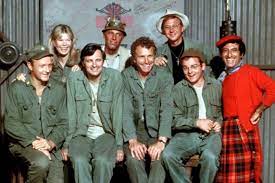MAS*H, a groundbreaking television series that aired from 1972 to 1983, holds an enduring place in the annals of TV history. Developed by Larry Gelbart, this dramedy set against the backdrop of the Korean War was not just another show; it was a cultural phenomenon that captivated audiences with its unique blend of humor, drama, and social commentary.
At its core, MASH was a medical comedy-drama series that portrayed the lives of the staff at the 4077th Mobile Army Surgical Hospital during the Korean War. The show’s brilliance lay in its ability to seamlessly shift between moments of hilarity and intense drama. Whether it was the antics of the irreverent Hawkeye Pierce (played by Alan Alda) or the poignant exploration of the toll war takes on individuals, MASH struck a balance that few shows have managed to achieve.
One of the series’ most remarkable attributes was its willingness to tackle serious and controversial subjects head-on. It didn’t shy away from addressing issues like the futility of war, the human cost of conflict, and the challenges faced by soldiers and medical personnel. This was particularly impactful during the Vietnam War era when the series aired. MAS*H used the Korean War as a metaphor for the ongoing conflict in Southeast Asia, offering a platform for societal reflection and critique.
The ensemble cast, including Alda, Loretta Swit, and Mike Farrell, brought their characters to life with depth and authenticity. Viewers became emotionally invested in the lives and struggles of these fictional medical professionals, making the show’s farewells to beloved characters all the more heart-wrenching.
Beyond its engaging characters and thought-provoking themes, MAS*H was a technical marvel, with its innovative use of a laugh track-free format. This approach allowed viewers to appreciate the gravity of certain scenes without the interruption of canned laughter, contributing to the show’s unique atmosphere.
Even decades after its original run, MAS*H remains relevant. Its commentary on the human condition, war, and the resilience of the human spirit continues to resonate with audiences worldwide. The series’ impact on television cannot be overstated; it paved the way for future shows to explore complex topics while maintaining a sense of humor.
In conclusion, MASH stands as a timeless classic in television history. Its ability to combine humor, drama, and social commentary in the context of war is a testament to its enduring relevance and impact on the medium. As long as there are viewers seeking thought-provoking entertainment, MASH will continue to be a touchstone for television excellence.
newshub



Recent Comments